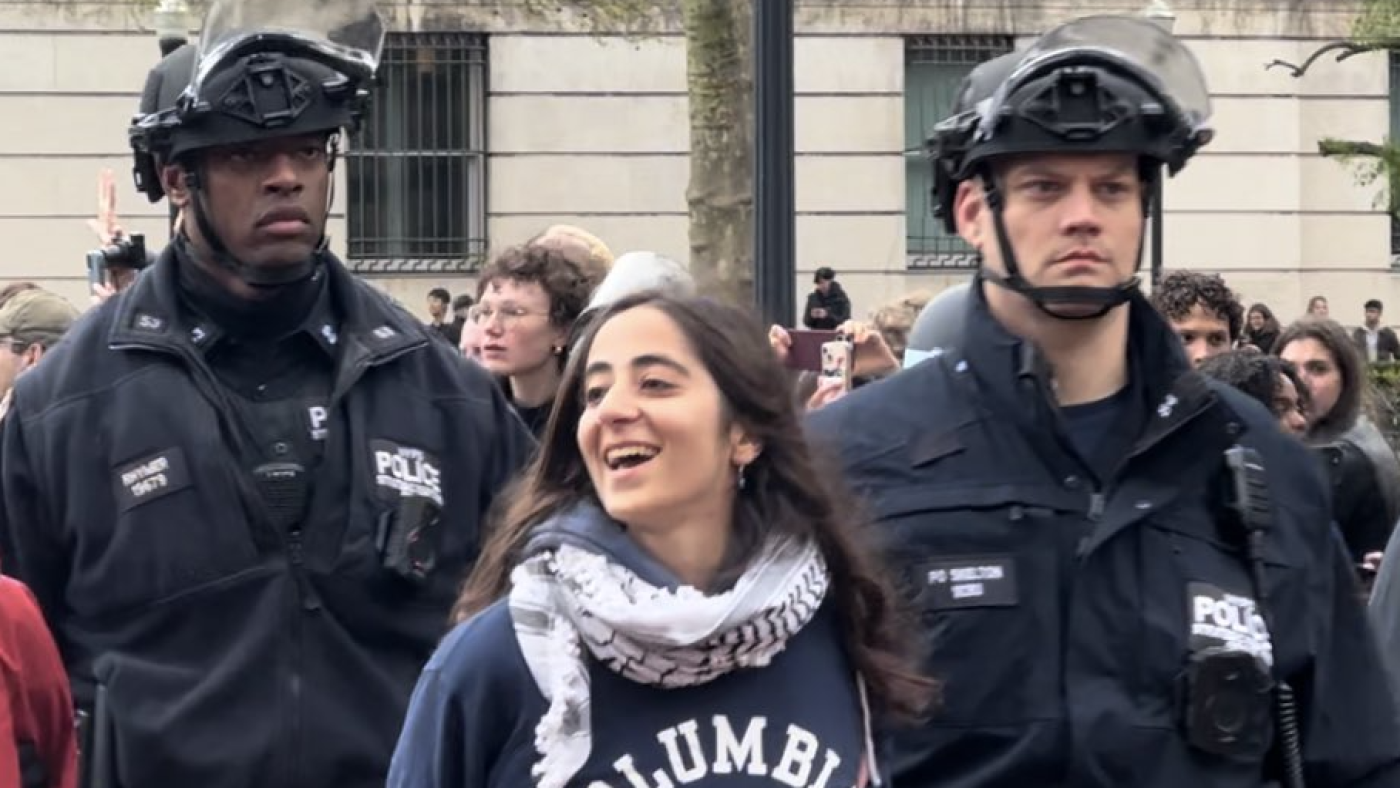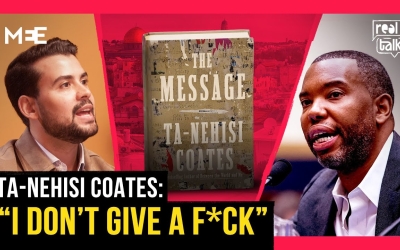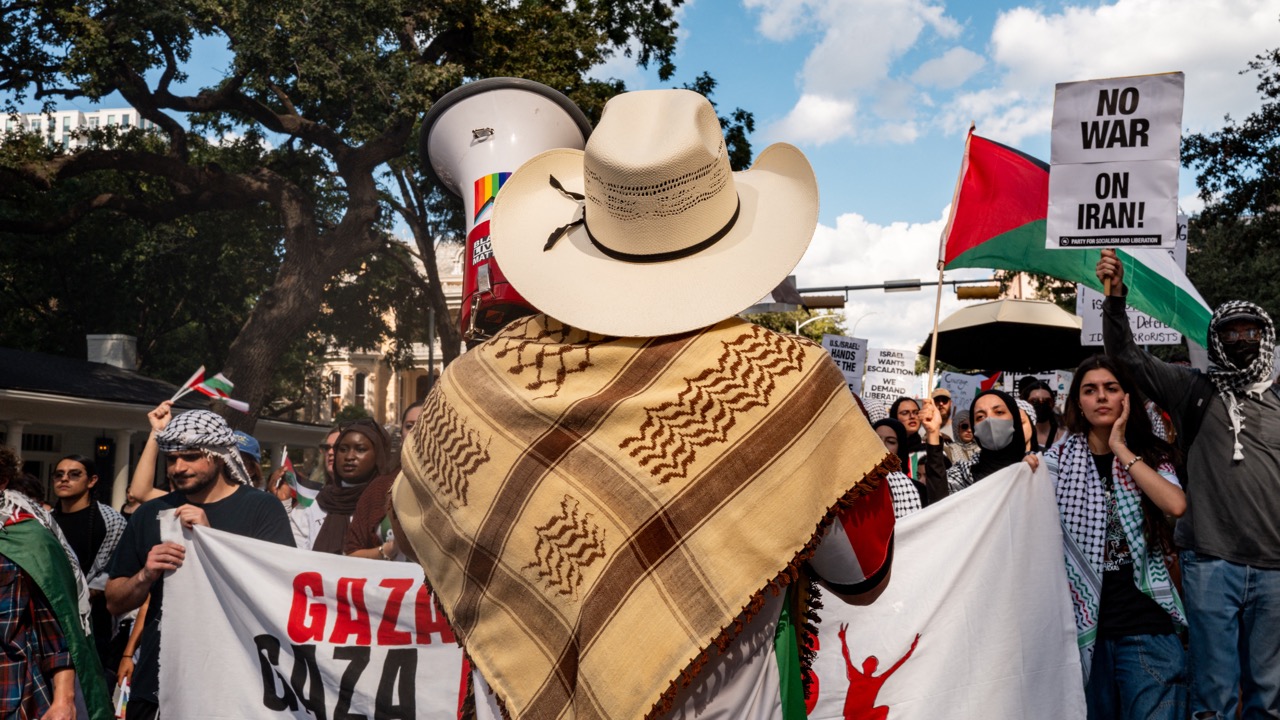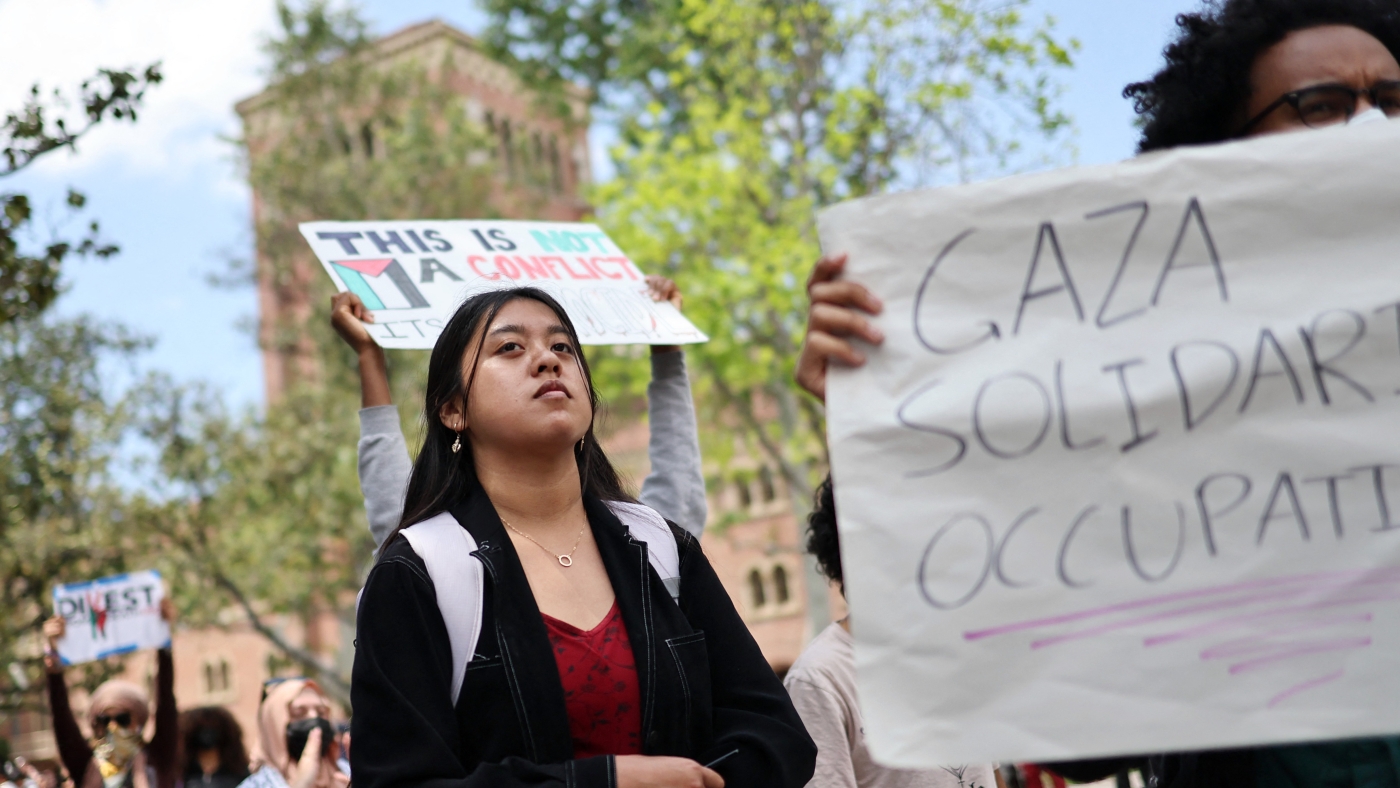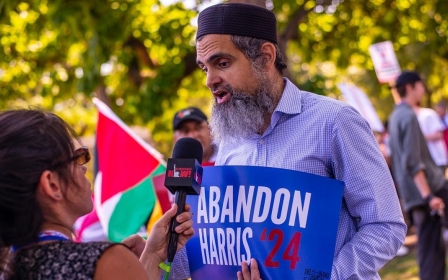US elections 2024: Young Americans battle disillusionment as they go to the polls
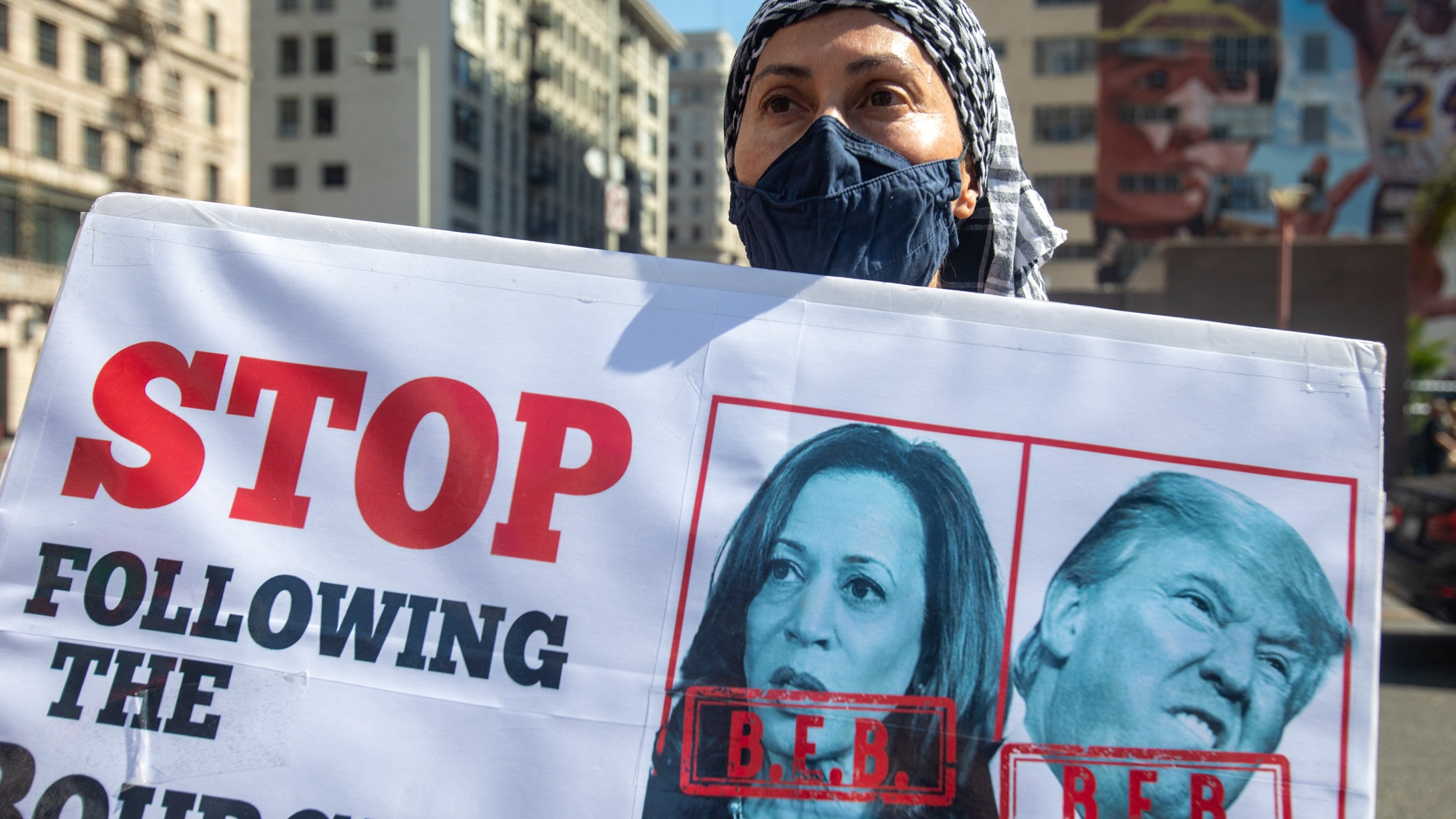
As voting day for the 2024 US presidential election approaches on 5 November, first-generation Americans of all backgrounds are left with the weight of deciding between domestic policies that affect them, and foreign policies that will affect those in their homelands.
Generation Z - those born in the mid-to-late 1990s to the early 2010s - now has an eligible voting population of over 40 million, including a new batch of over eight million new voters this year. Nearly half of these voters identify as people of colour.
As of 2023, there are approximately 4.3 million first-generation immigrants under 35 in the United States, while the number of second-generation Americans (children of immigrants) under 35 is estimated to be around 14 million.
Both of these categories are commonly referred to as “first-generation Americans”, leading the combined total to be approximately 20 million.
Although there is little data on how many of them are registered to vote, it is expected to surpass last election's turnout, with 57 percent of voters ages 18-34 saying they are “extremely likely” to vote in 2024.
New MEE newsletter: Jerusalem Dispatch
Sign up to get the latest insights and analysis on Israel-Palestine, alongside Turkey Unpacked and other MEE newsletters
Nine states - including the swing states of Michigan, Nevada and North Carolina - have more young people registered to vote than in the 2020 election.

This would mean millions of young Americans who are children of immigrants, or immigrants themselves, will find themselves in voting booths next week.
In terms of polling, Democratic nominee Vice President Kamala Harris seems to have a strong lead against former President Donald Trump. According to a new Harvard Youth Poll released by the Institute of Politics at the Harvard Kennedy School, Harris leads Trump by 20 points among registered voters under 30 (53 to 33 percent) and by 28 points among likely voters (60 to 32 percent)
Although this may be representative of the youth vote on a macro-level, it may not be completely accurate in depicting the beliefs of young first-generation American voters - specifically those who are voting with Israel’s ongoing war on Gaza in mind.
For many young Americans who have witnessed more than a year of what seems to be an endless and expanding war in the Middle East, the idea of voting for the same party that they deem as the perpetrator of genocide in Gaza - or even participating in electoral politics at all - is off the table.
Palestinian American: 'It feels very heavy'
Columbia University student Maryam Alwan is a first-generation Palestinian American, who used to “fully identify as a Democrat” when she was 18 and voted for Joe Biden for her first presidential election. Now, after seeing the Biden-Harris administration's full-throated support of Israel's war on Gaza, she is adamant that she will not be voting blue.
Instead, Maryam will be mailing her ballot to her home state of Virginia to cast her vote for the Green Party candidate, Jill Stein.
“It's not a ‘lesser of two evil situation’,” Alwan said. “Genocide should be a red line, not just for the people who are affected by it, but for anyone who has a conscience.”
Alwan says that if historic turnout for a third party costs the Democrats the election, the party will have to change its behaviour.
“It shows them that our votes matter and that you can't just completely discard an entire sect of the population. And it shouldn't even be about Arab and Muslim votes in the first place. It should be anyone with a conscience.”
Alwan once aspired to be in the inner circles that craft policies she wished to change, but after watching the lack of progress of those inside the government who oppose the US's support of Israel, she has changed her mind.
"The rhetoric here makes it seem like we owe loyalty to a party actively killing our people; that’s not a choice anyone should have to make"
- Maryam Alwan, Palestinian student
Alwan's participation in Columbia’s Gaza solidarity encampment in April was an eye-opening experience.
Alwan was among the organisers of the first encampment which was set up the same day Columbia University faced a trial with the Congressional House Education and Workforce Committee. She was also one of the hundred pro-Palestine students arrested, which sparked an international student movement now known as the “Student Intifada.”
“I really saw firsthand how much of politics is political theatre or spectacle or charade,” Alwan said. “We purposely timed the encampment to coincide with our president's interrogation in front of Congress because we wanted to show that it was a sham and that they were calling our opposition to literal genocide of our people ‘antisemitism’.”
Alwan said that some politicians descended on the encampment, including Speaker of the House Mike Johnson, who was booed. Others like Green Party presidential candidate Jill Stein and Congresswomen Alexandra Ocasio-Cortez and Ilhan Omar visited "their side" of the encampments. She said the lawmakers' visits were insincere and felt like photo-ops and were condemned by student activists for their performative nature.
In addition to the political circus that Alwan and her peers were thrust into on campus, she believes the politics of the Committee on Education and the Workforce - which is currently majority Republican - had a direct impact on the treatment of the students.
“The congressional elections are always overlooked, and they are extremely important,” Alwan said. “As a Columbia student, I've seen that very clearly with the direct crackdown that they've had on students in response to the House, which is quite literally funded by Aipac and getting instructions from them.”
In response to the widespread critique from mainstream liberals who say voting for a third party during this election is inadvertently a vote for Trump, Alwan said it only adds to the "guilt" a Palestinian American feels participating in the election.
"It feels very heavy. And I think the controversy of wanting to vote third-party makes it even worse because we already feel guilty for, quite literally, funding the decimation of our people. And then on top of that, we're made to feel guilty for not caring about other people, when that's not the case," Alwan said.
"It's unfathomable to me that we have spent at least $17.9bn (on Israel) when it could have been going to combating homelessness, undoing student loans or helping the people who are already in this country."
"The rhetoric here makes it seem like we owe loyalty to a party actively killing our people. That’s not a choice anyone should have to make."
Kenyan American: 'You are climbing over bodies to go and cast that vote'
For Batler Mogaka, 26, a Kenyan American who came to the US at the age of 11, his disillusionment with all of electoral politics is weighing heavy on his decision. He may vote Green, or not at all, but the one thing he knows for sure is that he will not be voting for Harris.
When speaking about those who are voting for Harris, Mogaka said: "This may sound crass, but you are climbing over the bodies of hundreds of thousands to go and cast that vote. That's just how I feel. And I'm not going to tell you not to do it, that's your prerogative. But it's something you have to live with."
Mogaka echoed the sentiments of the other first-gens, saying that the potential blame that may be cast on those who are not voting for Harris - in fear of another Trump presidency - falls squarely on the Democratic Party.
"Genocide is my red line because if we're willing to vote for them despite this, then they can do whatever they want," Mogaka said.
"Why should they ever listen to you as a voter? If 60 percent of voters are saying, 'We want an arms embargo. We want a ceasefire. We no longer want this,' and they are effectively telling us, 'Well, if you want your groceries to be cheaper or reproductive healthcare, then this is just something you have to live with'. At that point, what are we doing?"
When asked about the fears marginalised communities have of Trump, Mogaka said he also feels for them as a Black man in the US, and those fears drove him to vote for Biden in 2020. Now, after witnessing the situation in Gaza, he doesn't want to participate in having to claim his rights at the cost of the suffering of those abroad.
"I just can't put my own rights and comforts above an entire group being exterminated as we have this conversation," Mogaka said. "It actually eats at me that I voted for Biden in 2020. To see entire family lines being exterminated with my tax dollars and then to be told that it's for the betterment of my neighbours and our community members here in the United States, and we just have to be okay with that? It feels like we were being told that we have to accept this genocide for the sake of rescuing these rights."
In response to those who feel strongly about uplifting Harris as a presidential candidate, in part, because of her Black and brown identities, Mogaka said he feels that minority groups may be "losing sight" of what matters.
"We've become so enamoured and obsessed with representation and identity politics to the point that we're willing to accept and be placated by a Black or brown face as the head of empire and serving imperialism," Mogaka said.
"That's not always where the Black collective consciousness was during the times of the Black Panthers, Assata Shakur and Malcolm X."
Pakistani and Yemeni American: 'Lifted that curtain for us'
In Texas, Sabah Shah, 34, is still conflicted about what she'll do with her vote.
In comparison to those in swing states, young voters in historically red or blue states feel more leeway in casting a vote in protest against both the Republican and Democratic parties. For Shah, she is deciding whether she will vote third-party or even at all.
Shah is heavily active in organising for Palestine in the Dallas community after years of going to protests organised by her father when she was younger.
Like Alwan, she also used to believe in the power of politics in enacting change. She says all of that has changed since October 2023.
"I think that we can all agree that in the past, we had this illusion that voting for the right person would bring the change that we want to see and that people would stop being oppressed or exploited in the name of politics," Shah said.
"The illusion of democracy was kind of ingrained in us here, where we were told it's your civic duty to vote no matter what. The one thing this genocide has done is lifted that curtain for us living in the West."
Shah feels this war and Gaza are now a part of their lives and not something they can take a "break" from. She feels like voting makes her a "tool for empire", which means perpetuating "a system that's created to oppress and exploit people".
But, she says, it's important for people to still vote and "be strategic about using the empire's tools".
"In a world where we are liberated, voting would never determine if someone should be living or not. That's not normal."
For Shah, her guiding principle when she goes to the poll will be for an arms embargo on Israel, which probably will lead her to vote for the Green Party like many of those in her community.
"A lot of people are voting for Jill Stein mostly because people are feeling helpless. A lot of community members are shattered. They want to do something, even if it makes the slightest of difference, they're willing to take that."
When asked about having to deal with the potential of a Trump win in Texas, she said she feels a negative shift in attitude towards those she interacts with, especially as someone who wears the hijab. Trump supporters, she said, feel emboldened to act upon their racism towards Muslims and people of colour, but she's grown accustomed to it after 9/11.
Simultaneously, though, Shah said she does worry about the continual loss of reproductive rights. After a relative endured a traumatising experience with doctors during a miscarriage, Shah witnessed first-hand the impact of Trump's potential policies.
Regardless, she says, this is "far down on the priority list now because of the genocide".
Turkish American: 'There's just a little more fear about Donald Trump'
In contrast to Alwan, first-generation 21-year-old Turkish-American student Denise* (who wants to keep her identity private and participated in the University of Southern California’s pro-Palestine encampment) has decided she would mail her ballot to Michigan and vote for Harris.
With the weight of being from a swing state, she feels added pressure on her decision and the potential outcomes of a win for Trump.
“She's an absolutely horrible candidate, and I would never, ever, ever advocate for her,” Denise said. “But I kind of had a realisation last week that a Trump presidency would be worse, and I'm just going to have to vote for Harris.”
She does think, though, that people underestimate Harris's damage potential domestically.
"Democrats have become more conservative on their immigration policy and their approach to abortion, etc, so I think the amount of damage that Trump would do compared to Democrats is getting less and less," Denise said.
"They are one and the same when it comes to policies on Israel. But I don't know, there's just a little bit more fear about Donald Trump and the risk that he poses to other marginalised peoples in the US."
In addition to her fear of another Trump presidency, Denise said she is also a bit suspicious of Stein as a presidential candidate.
“I definitely thought about voting for Stein for a while, but the one thing that really deterred me is the fact that it is true that the Green Party, and Stein especially, just appear every four years. They don't really have any grassroots campaign or do anything on the local levels, never try to necessarily change local policy."
Like Alwan, Denise had hopes of working in the political sphere earlier in her college career as a journalist. After 7 October of last year, she began to learn about the history of occupied Palestine and Israel’s ongoing occupation and oppression of Palestinians. She felt so deeply about the situation that she created Trojans for Palestine - which eventually organised USC’s encampment.
“It affected me a lot because I was seeing everything firsthand on Tiktok from [influencers] Bisan and Plestia. I was seeing these things happen from their point of view – and it ‘radicalised’ me. ‘Radicalised’ as in I care that other people live, because that's ‘radical’, right?”
Now, Denise says she wants nothing to do with politics or journalism.
“I wanted to do political journalism, work in DC, work for CNN or work for MSNBC or something like that. I have zero hopes or aspirations of becoming a journalist. I don't have the willpower to try to change the industry. So I’m no longer pursuing that because of America's attitude towards Gaza, and I hopefully will find something in the marketing field.”
Although she’s taken the decision to vote for Harris, she does not feel inclined to exert any effort in convincing her peers to do the same. The responsibility of earning that vote is on the Democratic Party, she says, and there should be no blame on individuals “when the Democratic Party as a whole has proven that they do not give a crap about their voter base".
Even in her own household, Denise's decision differs from her parents. Due to the Biden-Harris administration’s behaviour in Gaza, they have decided to vote for Stein.
"Knowing that every single paycheck she gets, a portion of it is going to kill children in Gaza, she (her mother) physically cannot get herself to vote for someone who would continue that."
Middle East Eye delivers independent and unrivalled coverage and analysis of the Middle East, North Africa and beyond. To learn more about republishing this content and the associated fees, please fill out this form. More about MEE can be found here.


